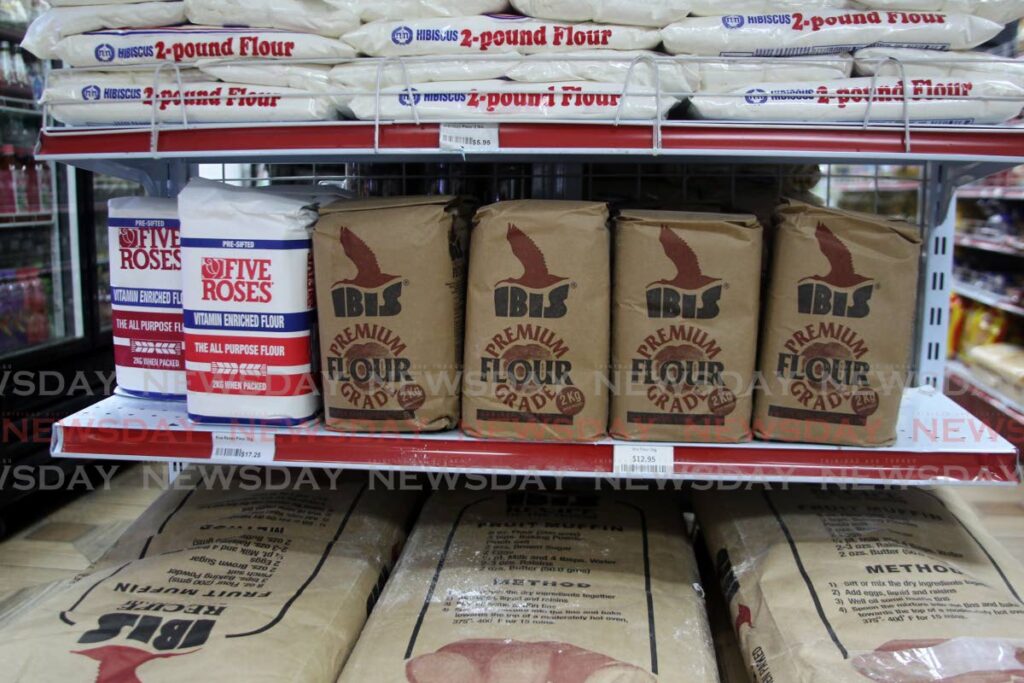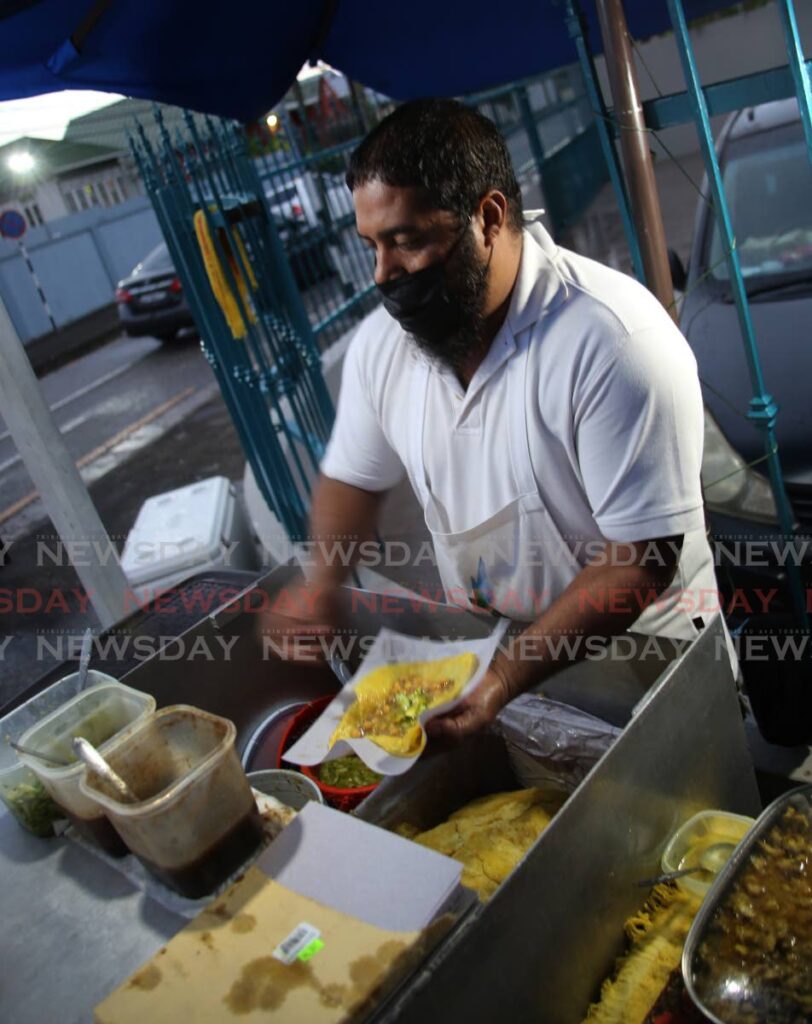[UPDATED] NFM raises wholesale flour prices between 15-22 per cent

AND RHIANNA MC KENZIE
From January 3, consumers will be paying more for flour bought wholesale, after the National Flour Mills (NFM) on Wednesday announced a price hike owing to international price shocks.
NFM said that its wholesale price would be increased between 15-22 per cent and suggested a 19 per cent increase in the retail price of flour.
In a media release, CEO Ian Mitchell said NFM could no longer absorb the shocks of soaring international wheat and shipping costs.
NFM, a state-owned company, said since 2008 there has not been a price adjustment and the decision came after several internal initiatives to improve operating efficiency and reduce processing costs to contain expenditure and maintain the price of flour.
Mitchell said, “This was by no means an easy decision, as we did everything within our control to try to hold our prices; but with the staggering increases in raw material and shipping costs, we were left with no choice but to make the adjustment.
“We are acutely aware of the knock-on effect that an increase in the price of flour could have in the market, but we cannot sell a product for less than it costs to produce.”
NFM said the price of spring wheat moved from as low as US$5 per bushel in 2020 to as high as US$10.91 per bushel in 2021 and the cost of freight increased by more than 110 per cent.
It said it tried over the past 18 months to offset the increases through by focusing on productivity and efficiency throughout its operations. It said it was able to reduce indirect manufacturing cost per tonne by four per cent during reduced working hours necessitated by the covid19 pandemic curfew.
However, the global impact of adverse weather affected crop yields and continued supply-chain challenges increased the cost of agricultural inputs, like fertilisers, and the overall impact of the pandemic caused shipping costs to skyrocket.

Also commenting in the statement, NFM chairman Nigel Romano said the company as a price-taker had little control over the external costs that drove up prices.
“It’s an unfortunate analogy, especially given the realities of climate change, but we have been confronted by the perfect storm –– 2020 witnessed the lowest wheat yields since 2007, and the supply-chain disruptions caused by the pandemic have increased freight costs significantly, further impacting the landed cost of all grain and other material inputs. NFM is a price-taker.
"We have no control over the landed costs of our imported raw materials, which now account for 64 per cent of our production costs. I think the team is doing a good job improving our internal processing and driving other costs down, especially during these trying times, and we will continue to find ways to continually improve.”
In November, NFM reported a steep decline of $4.1 million after tax profit for the nine-month period ending September 2021.
Newsday attempted to reach Minister of Trade and Industry but was unable to up until news time.
Earlier this year, bakeries raised prices owing to production and supply cost increases. With this recent announcement the possibility for further increases exists, said owner of Puff n Stuff owner Gregory Laing.
He told Newsday that while it was too soon to commit to a new pricing structure, costs would be better known by mid-January.
Linda’s bakery was one of the first bakeries to raise its prices by 50 cents-$1 in June, owing to increased costs in imports, freight, production, maintenance of machinery and other labour outputs. Kiss Baking Company also raised prices in September by about 30 cents. The management of both companies could not be reached for comment.
In response, Supermarket Association (SATT) president Rajiv Diptee said NFM's price increases signified that businesses cannot continue to absorb price shocks brought on by the pandemic.
He said, “The 19 per cent price increase will be noted by all in the industry as an indication that corporation sole cannot absorb the associated cost of operations impacted by the global pandemic by allowing market forces to dictate the price at which it remains available for consumers.
He also explained that there was no hard-and-fast rule for when supermarkets can implement new retail prices.

He said each supermarket purchases different quantities at different times and the change in price would be based on the amount of stock in hand and their next reorder date.
At Chee Mooke Bakery in Port of Spain, one customer who requested anonymity, said he only hopes the quality of flour-based products remains the same. “If it is a global issue, we have to pay for it. We can’t argue with that,” he said.
Another customer, Tom Linton, said customers have no choice but to live with it. “Everything is raised. I am not going home to make bread. I have to buy it. Once you need it you will purchase it. People will only talk for a while.”
Sean Roberts, a customer at Linda’s Bakery, Excellence Stores mall, Frederick Street, Port of Spain, said it should have been expected that the prices would go up. “You can’t expect suppliers to take the full brunt. It would be nice if it didn’t raise but it is something I was prepared for.”
Mitch Thomas of Mitch Doubles on Ariapita Avenue, Port of Spain told Newsday on Wednesday the raise will impact the price of doubles eventually. “Maybe (it will raise) but we don’t know when,” he said.
“It will have a big impact on doubles. Channa raised, oil raised, now flour? Things will be harder now. These are the main ingredients in doubles.
“Things are already so hard in the country. This is a poor man food. I don’t see a reason for them to raise it.”
His wife Crystal Thomas also said doubles won’t be the only food to be impacted by the raise. “All local food is flour. Fried chicken, bake and shark, pastas. It’s not just doubles. It will affect everything in the country.”

NFM's flour products include breading flour, cookie flour, cracker flour, fry bake mix, Good n' Natural brand – cracked wheat, wheat bran, whole wheat flour – Hibiscus flour, Lion’s self-rising flour, Lotus all-purpose flour, Lotus bakers’ flour, Lotus whole wheat flour, Ibis flour, roti and doubles flour.
This story has been adjusted to include additional details. See original post below.
The country has been hit with another food price increase as the National Flour Mills (NFM) announced on Wednesday that its wholesale price would be increased between 15 per cent and 22 per cent and suggested a 19 per cent increase in the retail price of flour. NFM said its wholesale price increase takes effect from January 3.
In a media release, CEO Ian Mitchell said NFM could no longer maintain the shocks of soaring international wheat and shipping costs.
NFM, a state-owned company, said since 2008 there has not been a price adjustment and the decision came after several internal initiatives to improve operating efficiency and reduce processing costs to contain expenditure and maintain the price of flour.
Mitchell said, “This was by no means an easy decision, as we did everything within our control to try to hold our prices; but with the staggering increases in raw material and shipping costs, we were left with no choice but to make the adjustment.
“We are acutely aware of the knock-on effect that an increase in the price of flour could have in the market, but we cannot sell a product for less than it costs to produce.”
NFM said the price of spring wheat moved from as low as US$5 per bushel in 2020 to as high as US$10.91 per bushel in 2021 and the cost of freight increased by more than 110 per cent.
It said it tried over the past 18 months to offset the increases through by focusing on productivity and efficiency throughout its operations. It said it was able to reduce indirect manufacturing cost per tonne by four per cent during reduced working hours necessitated by the covid19 pandemic curfew.
However, the global impact of adverse weather affected crop yields and continued supply-chain challenges increased the cost of agricultural inputs, like fertilisers, and the overall impact of the pandemic caused shipping costs to skyrocket.
Also commenting in the statement, NFM chairman Nigel Romano said the company as a price-taker had little control over the external costs that drove up prices.
“It’s an unfortunate analogy, especially given the realities of climate change, but we have been confronted by the perfect storm –– 2020 witnessed the lowest wheat yields since 2007, and the supply-chain disruptions caused by the pandemic have increased freight costs significantly, further impacting the landed cost of all grain and other material inputs. NFM is a price-taker.
"We have no control over the landed costs of our imported raw materials, which now account for 64 per cent of our production costs.
"I think the team is doing a good job improving our internal processing and driving other costs down, especially during these trying times, and we will continue to find ways to continually improve.”

Comments
"[UPDATED] NFM raises wholesale flour prices between 15-22 per cent"